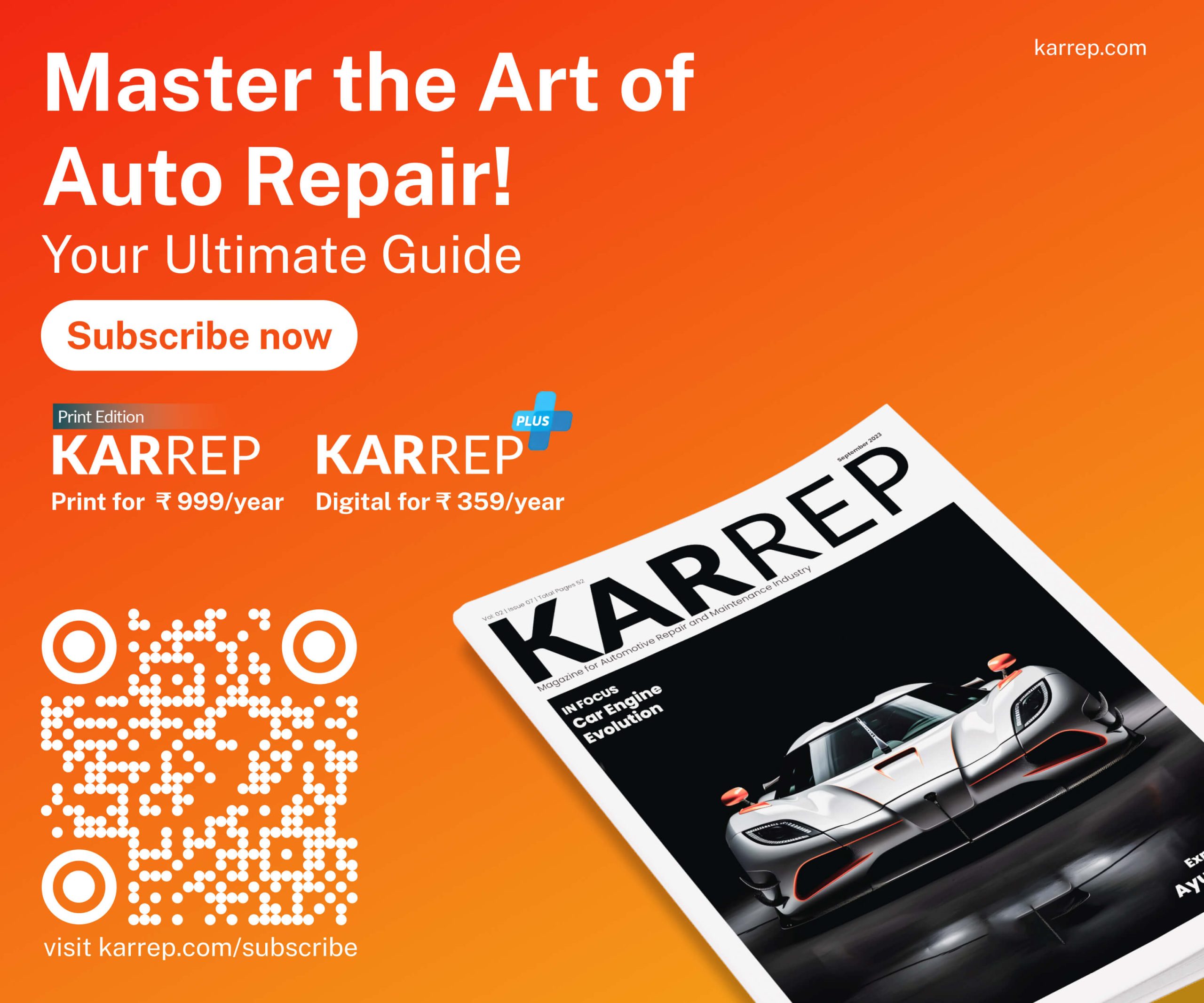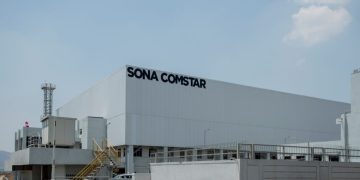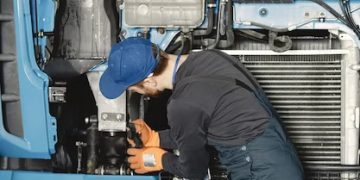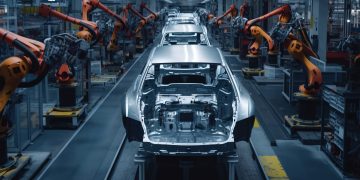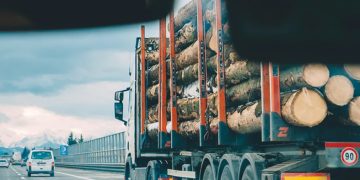Could you tell us about your journey as an entrepreneur in the automobile sector and how you have carved a niche for yourself and your company, mquik.
As an entrepreneur in the automobile sector, my journey has spanned 25 years, during which I founded and built mquik, my company. From a young age, I had a passion for cars and knew that I wanted to make a mark in the industry. After completing my automobile engineering, I gained valuable experience working in a Maruti Dealership as a Helper Technician with a salary of ` 750/- and after that as a sales executive in a two-wheeler dealership.
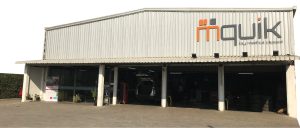
In 1998, I took a brave step and began my own business, choosing a special way to offer a mobile car service. Using two converted Maruti Vans as my mobile workshops, I started receiving an incredible response. As the number of calls increased and became difficult to manage, I decided to provide vehicle repairs directly from the parking area of our home to better serve my customers. While I was fixing cars in the small parking space of my home, I began to understand what vehicle owners wanted from independent repair shops in India. This made me want to create a new standard of honesty and professionalism in the car repair industry. My journey as an entrepreneur has had its ups and downs, but I can say that I love what I do now. Building my business, mquik, and making it stand out has been a continuous effort, driven by my dedication to giving great service and making customers happy. Though I haven’t completely revolutionised the industry yet, I’m proud of the work we do.
As the chairman of the Automobile Committee of the Southern Gujarat Chamber of Commerce & Industry (SGCCI), could you highlight your role in promoting the growth and development of the automobile industry in the region?
As the chairman of the Automobile Committee of the Southern Gujarat Chamber of Commerce & Industry (SGCCI), I have played a significant role in promoting the growth and development of the automobile industry in the region since 2012. SGCCI, established in 1940, has been dedicated to serving the businesses of South Gujarat by facilitating trade, commerce, and industry.
In my capacity as the committee chairman, I have spearheaded initiatives aimed at fostering the growth of the automobile sector. These include organising trade fairs, conducting business networking events, arranging training programmes, and advocating for policies that benefit the business community. Through these efforts, we aim to create an environment conducive to the expansion and excellence of the automobile industry in the region.
As the Convener of the Surat International Auto Expo, how do you believe events like these contribute to the sustainable development of the automotive industry?
As the Convener of the Surat International Auto Expo, I firmly believe that events like these play a crucial role in fostering the sustainable development of the automotive industry. The Surat International Auto Expo has been recognised as a leading automotive show in the country, with five successful exhibitions Organised to date.
These expos serve as a platform to showcase world-class vehicles and designs, featuring theme pavilions that highlight the latest advancements and trends in the industry. Additionally, the Auto Expo facilitates road safety programmes, seminars, and conferences to promote awareness and education among consumers and industry professionals.
By bringing together industry stakeholders and consumers, the Auto Expo serves as a bridge, enabling valuable interactions and collaborations. This contributes to the sustainable development of the automotive industry by fostering innovation, promoting market growth, and enhancing the overall customer experience.
How does your role as the National General Secretary of All India Automobile Workshop Association (AIAWA) contribute to the advancement of the automobile repair and maintenance sector in India?
As the National General Secretary of the All-India Automobile Workshops Association (AIAWA), my role significantly contributes to the advancement of the automobile repair and maintenance sector in India. The AIAWA was established with the aim of providing a platform for workshops to collaborate, share best practices, and network within the industry.
One of the keys focuses of the association is to promote the growth and development of the independent workshop industry in India. This is achieved through various means, including providing access to the latest information, training, and tools necessary for workshops to deliver high-quality services to their customers. The AIAWA also serves as a forum for the exchange of ideas and information, enabling members to stay updated on key industry issues.
Moreover, the association actively advocates for the interests of its members and works in collaboration with government agencies and other stakeholders to promote policies and programmes that support the growth and development of the industry as a whole.
In my capacity as the National General Secretary, I am committed to promoting excellence in the independent workshop industry and supporting the professional growth of our members. The AIAWA offers a range of services and benefits, including training and education programmes, industry research and analysis, networking opportunities, and advocacy efforts on behalf of the industry. Through these initiatives, we contribute to the advancement of the automobile repair and maintenance sector in India.
As an industry think tank, how do you perceive the importance of independent workshops in catering to the automotive needs of rural communities?
I perceive independent workshops as playing a vital role in catering to the automotive needs of rural communities. Multi-brand service centres, which are emerging as a significant segment within the auto service industry, are particularly important in this context. These workshops offer a wide range of services for various car brands, providing quality work and authentic OEM spare parts.
What sets these independent workshops apart is their ability to offer similar standards of quality and authenticity as authorised service centres but at a relatively lower cost. This combination of quality assurance and cost-effectiveness is appealing to many car owners, including those in rural communities. Independent workshops provide accessible and affordable solutions for vehicle maintenance and repairs, ensuring that individuals in rural areas can keep their vehicles in good condition without incurring excessive costs.
By offering reliable services and utilising quality spare parts, independent workshops contribute to the sustainability and longevity of vehicles in rural communities. They help bridge the gap in access to vehicle services, enabling individuals in rural areas to maintain their vehicles and address their automotive needs effectively.
What steps has AIAWA taken to enhance the skills and knowledge of unskilled workers in rural areas, enabling them to provide better automotive services?
The All-India Automobile Workshop Association (AIAWA) has recognised the importance of enhancing the skills and knowledge of unskilled workers in rural areas to enable them to provide better automotive services. As part of this commitment, the AIAWA is currently collaborating with the International Automobile Centre of Excellence (IACE) for skill development and upgradation programmes for member workshops.
Moving forward, the AIAWA aims to take further initiatives to enhance the skills of unskilled workers in rural areas. These initiatives will focus on providing skill enhancement opportunities through training programmes, workshops, and other educational resources. By equipping these workers with the necessary knowledge and expertise, the AIAWA aims to improve the quality of automotive services in rural communities and promote professional growth within the industry.
The association recognises the importance of empowering unskilled workers, providing them with the tools and training needed to deliver superior automotive services. By investing in skill development, the AIAWA aims to uplift the automotive industry as a whole and contribute to the overall development of rural areas in terms of employment opportunities and improved service standards.
What role do you think a collaboration between industry stakeholders, such as mquik, government agencies, apex bodies like AIAWA, NGOs, and Academia, can play in facilitating the upskilling of unskilled workers in independent workshops in rural India?
Collaboration between industry stakeholders, government agencies, apex bodies like AIAWA, NGOs, and academia can play a crucial role in facilitating the upskilling of unskilled workers in independent workshops in rural India. The Indian automobile market is a rapidly growing sector, contributing significantly to the nation’s GDP and providing millions of employment opportunities. However, there is a pressing need to develop a skilled automotive workforce that can effectively address the evolving challenges and advancements in the industry.
To meet this challenge, collaboration among stakeholders is essential. Apex bodies like AIAWA can contribute their industry expertise and resources to design and implement upskilling initiatives. NGOs can play a vital role in reaching out to rural communities, identifying training needs, and implementing programmes on the ground.
Additionally, academia can contribute through curriculum development, providing specialised courses and training modules tailored to the needs of the automotive industry. Collaborative efforts between industry stakeholders and academia can bridge the industry- academia gap, ensuring that education and training align with the industry’s requirements.
By coming together and pooling their expertise, resources, and networks, these stakeholders can develop comprehensive upskilling programmes that offer hands-on training, internships, and time-bound projects. Such programmes can empower unskilled workers in independent workshops with the necessary skills to handle modern automotive technologies, including electric vehicles. Promoting a culture of continuous learning and professional development within the industry will be crucial to meet the demands of a rapidly evolving automotive landscape.
Overall, collaboration between industry stakeholders, government agencies, apex bodies, NGOs, and academia can create a synergistic approach to upskilling unskilled workers in rural India, contributing to the growth and development of the automotive industry while providing improved services to rural communities.
How do you envision the future expansion of mquik across the nation, and what role will technology play in achieving your growth objectives?
The future expansion of mquik across the nation is envisioned as a journey of spreading our unique culture, fuelled by passion, technology, integrity, and commitment. We aim to establish mquik as a prominent presence in the automobile service industry across India, providing exceptional services to customers nationwide.
Technology will play a pivotal role in achieving our growth objectives. We recognise the transformative power of technology in enhancing customer experiences, streamlining operations, and driving innovation. Leveraging technological advancements, we will focus on developing digital platforms, implementing efficient systems, and utilising data-driven insights to optimise our services and processes.
Furthermore, technology will enable us to expand our reach and connect with a wider customer base. Through digital marketing strategies, online booking platforms, and customer engagement tools, we will enhance accessibility and convenience for customers in various locations across the country.
Embracing technology as a driving force, we aim to create a seamless and personalised experience for our customers while maintaining our commitment to quality and professionalism. As we continue to expand, technology will be at the forefront of our growth strategy, empowering us to deliver exceptional automotive services and establish mquik as a trusted and renowned brand nationwide.
The transition to alternative fuel vehicles is gaining importance. How is mquik adapting to this changing landscape and incorporating sustainable practices into its operations?
At mquik, we recognise the growing importance of the transition to alternative fuel vehicles and the need for sustainable practices in the automotive industry. We are actively adapting to this changing landscape and incorporating sustainable practices into our operations.
To ensure our team members are well-prepared for the shift to alternative fuel vehicles, we collaborate with national and international institutes for training programmes. These programmes equip our team with the necessary knowledge and skills to handle and service these vehicles effectively.
Moreover, we actively explore partnerships and collaborations with industry stakeholders, manufacturers, and suppliers who share our commitment to sustainability. By working together, we aim to foster innovation and drive the adoption of sustainable practices within the automotive service industry.
At mquik, we view the transition to alternative fuel vehicles and the incorporation of sustainable practices as not only a challenge but also an opportunity. We embrace this shift as a chance to contribute to a greener future while providing high-quality services to our customers.
In your opinion, what are the key factors driving sustainable development in the automobile repair and maintenance industry, and how is mquik contributing to this aspect?
The key factors driving sustainable development in the automobile repair and maintenance industry include:
Environmental Consciousness: Increasing awareness and concern about environmental issues have led to a greater demand for sustainable practices in the industry. Customers are seeking service providers who prioritise eco-friendly initiatives and minimise their environmental impact.
Technological Advancements: The integration of advanced technologies in the automobile industry has paved the way for more sustainable solutions. This includes the development of electric and hybrid vehicles, as well as the use of digital tools and data analytics to optimise operations and reduce waste.
Regulatory Requirements: Government regulations and policies focused on reducing emissions, promoting energy efficiency, and encouraging sustainable practices play a significant role in driving sustainable development in the industry. Compliance with these regulations is crucial for service providers to operate in a sustainable manner.
Consumer Expectations: Customers today expect not only high-quality repairs and maintenance but also sustainable practices from service providers. They prioritise companies that demonstrate a commitment to sustainable operations, including energy-efficient practices, waste management, and responsible disposal of hazardous materials.
mquik is actively contributing to sustainable development in the automotive repair and maintenance industry through various initiatives:
Adoption of Eco-friendly Practices: We prioritise the use of environmentally friendly products, such as eco-friendly lubricants and cleaning agents, to minimise our environmental impact. We also promote responsible waste management and recycling practices within our operations.
Embracing Technology: mquik leverages digital tools and technologies to optimise operations and reduce waste. This includes implementing efficient scheduling systems, digital record-keeping, and data-driven analysis to improve overall efficiency and minimise resource consumption.
Training and Awareness: We prioritise training and awareness programmes for our team members, ensuring they are equipped with the knowledge and skills to incorporate sustainable practices into their work. This includes training on handling alternative fuel vehicles, promoting energy-efficient practices, and adhering to environmental regulations.
Partnerships and Collaborations: mquik actively seek partnerships with suppliers and manufacturers who share our commitment to sustainability. By collaborating with like-minded organisations, we can collectively drive sustainable practices and innovation within the industry.
Through these efforts, mquik aims to contribute to the sustainable development of the vehicle repair and maintenance industry by minimising our environmental footprint, embracing technological advancements, promoting awareness and training, and fostering collaborations with stakeholders who share our sustainability goals.
What advice would you give to upcoming entrepreneurs in the industry who aspire to make a mark and contribute to the growth of the automotive repair and maintenance sector?
Here are some pieces of advice for upcoming entrepreneurs aspiring to make a mark and contribute to the growth of the automotive repair and maintenance sector:
Gain Industry Experience and Knowledge: Before venturing into entrepreneurship, it is crucial to gain hands-on experience and deep knowledge of the vehicle repair and maintenance sector. Work in the industry, learn from experts, and understand the challenges, trends, and customer needs.
Identify a Unique Value Proposition: Differentiate yourself by identifying a unique value proposition for your business. It could be offering specialised services, targeting a specific customer segment, providing exceptional customer service, or leveraging innovative technologies. Find your niche and focus on delivering value.
Embrace Technology and Innovation: Stay updated with the latest technological advancements and industry trends. Embrace digital tools, automation, and data analytics to optimise your operations, enhance efficiency, and improve customer experiences. Innovate and explore new ways to provide better services.
Build a Strong Network and Partnerships: Networking is key in any industry. Connect with professionals, industry associations, suppliers, and manufacturers to build a strong network. Collaborate and form partnerships to leverage resources, share knowledge, and expand your reach.
Focus on Customer Satisfaction: Place customer satisfaction at the core of your business. Prioritise delivering high-quality services, ensuring transparency, and building trust with your customers. Word-of-mouth recommendations and positive reviews can go a long way in growing your business.
Invest in Employee Training and Development: Your employees are the backbone of your business. Invest in their training and development to ensure they have the necessary skills and knowledge to provide top-notch services. Foster a positive work culture that encourages learning, growth, and teamwork.
Stay Updated with Regulations and Industry Standards: The vehicle repair and maintenance sector is subject to various regulations and industry standards. Stay informed and compliant with safety, environmental, and legal requirements. This will help you build trust with customers and establish credibility.
Continuously Adapt and Innovate: The industry is evolving rapidly, with new technologies, customer expectations, and sustainability initiatives shaping its future. Stay agile, adapt to changes, and continuously innovate to stay ahead of the curve. Embrace opportunities and turn challenges into growth prospects.
Seek Guidance and Mentorship: Don’t hesitate to seek guidance and mentorship from experienced entrepreneurs and industry experts. Their insights and advice can provide valuable perspectives and help you navigate challenges more effectively.
Stay Passionate and Persistent: Entrepreneurship is a journey that requires passion, resilience, and persistence. Stay motivated, believe in your vision, and never give up. Embrace failures as learning opportunities and keep striving for excellence.
By following these principles, upcoming entrepreneurs can make a mark in the automotive repair and maintenance sector and contribute to its growth. Remember, success comes with dedication, innovation, customer focus, integrity, and a commitment to continuous improvement. These qualities together pave the way for achieving our goals and making a positive impact in our endeavours.


